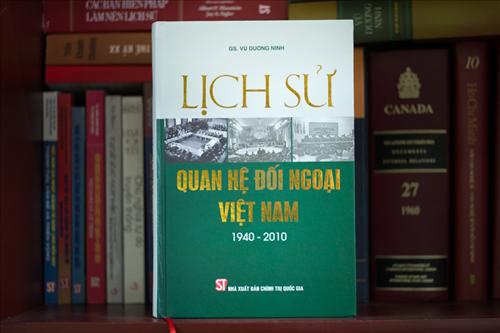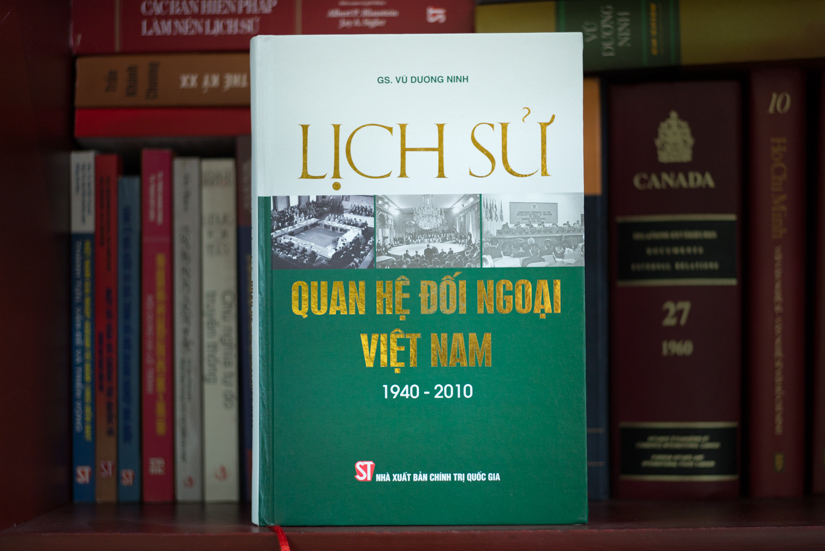

The book cover. (Photo: Jackie Chan)
It can be said that the book "History of Vietnam's Foreign Relations 1940-2010Professor Vu Duong Ninh's book, recently published by the National Political Publishing House, provides a comprehensive overview of Vietnam's foreign relations over the past 70 years. Drawing on a wealth of carefully selected materials, the author systematically presents the historical development of Vietnam's foreign relations from 1940 to 2010, encompassing the period leading up to the August Revolution and the end of the first decade of the 21st century. Compared to previously published studies on Vietnam's foreign relations, the book, a testament to Professor Vu Duong Ninh's dedication and effort, stands out with its historical approach. Events are presented logically and scientifically, based on diverse, rich, and carefully selected historical sources. The historical lessons learned are concise, succinct, and persuasive. This is a fundamental, systematic, and meticulously researched work of significant value on Vietnam's foreign relations.
Throughout the entire 462-page work is the vision and research perspective on international relations in general, and Vietnamese foreign relations in particular, of an experienced researcher. In this work, the Vietnamese revolution is examined within an international context, closely linked to and influenced by external factors.However, the ultimate decision-maker remains the Vietnamese people under the leadership of the Communist Party of Vietnam and the ideology of President Ho Chi Minh.
To date, there have been numerous studies on national history, Party history, and the history of the resistance war, but the number of works on Vietnam's history of international relations is still relatively small. Therefore, this book...History of Vietnam's Foreign Relations 1940-2010"This meets the needs of a wide readership seeking information in the context of Vietnam's gradual and deeper integration into regional and global politics."
The book is structured into nine chapters. Unlike previous studies, the author dedicates the opening chapter to a general overview of published works, both domestically and internationally, on the topic of Vietnam's foreign relations. The research overview is presented chronologically, helping readers, especially graduate students and postgraduate students, to grasp the achievements and limitations of previous works, thereby enabling them to build upon and delve deeper into unanswered questions. The author notes that although many research works have been published, there are still areas where...certain limitations in exploiting original source materials."And when consulting other works, especially books by foreign authors, it is very necessary to have"independent thinking"(1)of the reader.
The following chapters are presented according to a unified logic: the international and domestic contexts leading to the main events and developments in Vietnam's foreign relations, highlighting the foreign policy principles and strategies of the Party and State, and from there drawing conclusions, assessments, and historical lessons.
In Chapter IThe foreign relations of the Vietnamese revolution during the period leading up to the General Uprising of 1940-1945."The author successfully analyzed the strategy of the Indochinese Communist Party in the extremely complex context of World War II, when Vietnam had to endure a 'double yoke' and the alliance of major powers. One of the timely and wise decisions of the Indochinese Communist Party at that time was to enlist all available forces, avoiding a situation where it had to confront multiple enemies simultaneously and relying primarily on its own strength."
Chapter II is devoted to analyzing the developments of “Foreign relations during the first year of the democratic republic (September 1945-December 1946)"Although this period lasted only one year and three months, what Vietnam's foreign relations achieved was of immense importance to the destiny and future of the young republic. It is no coincidence that Professor David Marr of the Australian National University has also recently published a massive 721-page work on this crucial period in Vietnam's history.(2)In the context of internal and external enemies, and to avoid facing multiple adversaries simultaneously, the signing of the Preliminary Agreement on March 6, 1946, can be considered one of the exemplary foreign policy actions, leaving many important lessons about the combination of...Between a firm stance and flexible measures, between tactical concessions and strategic resolve, between seizing the possibility of peace and preparing for war..(3)
"Foreign relations during the nationwide resistance war against French colonialism (1946-1954)"This is the main content of Chapter III. In this chapter, the author skillfully answers the question of how the Cold War, the bipolar order, and the regional situation impacted the course and dynamics of the war in Vietnam, culminating in the Geneva Conference on Indochina in 1954. The ideological confrontation between the major powers led to the Cold War in general, the Korean War (1950-1953), and the Indochina War (1946-1954). It was also the major powers that arranged the Panmunjom Conference to end the Korean War and the Geneva Conference to end the Indochina War. The signing of the Geneva Accords on July 21, 1954, left many important lessons for Vietnam's foreign relations, as Professor Vu Duong Ninh rightly observed, "Although the Geneva Conference did not achieve its ultimate goal of unification, it was nonetheless a necessary stopping point to prepare for the next stage of the struggle.”(4)
Chapters IV and V are devoted to foreign relations during the War of Resistance against the US, covering two periods: 1954-1968 and 1968-1975. While the first period saw Vietnam's foreign relations summarized through activities such as the struggle to demand that the US and its puppet regime strictly adhere to the Geneva Accords, strengthening solidarity with socialist countries, making the world understand the just nature of the South Vietnamese people's struggle against aggression, and highlighting the role of the National Liberation Front, the focus of Vietnam's foreign relations in the second period was the struggle at the negotiating table during the Paris Peace Conferences of 1969-1973. Although some foreign scholars recently argue that signing the Paris Agreement was too costly for Vietnam.(5)Or is this just a way for the US to withdraw with honor?(6), but according to Professor Vu Duong Ninh, it is clear that “Vietnamese diplomacy successfully solved an extremely difficult problem by maintaining independence and sovereignty, independently determining its own foreign policy, while simultaneously preserving unity and effectively securing assistance from socialist allies.”(7)
Chapter VI focuses on analyzing the extremely complex and tense developments in Vietnam's foreign relations during the period 1975-1995, when the country had to continue the war to defend its southwestern and northern borders, fulfill its international obligations to help the Cambodian people overthrow the genocidal regime, and face isolation, encirclement, and embargoes imposed by Western countries. The author frankly points out Beijing's true purpose in the war of aggression against Vietnam under the guise of "self-defense counterattack." At the same time, with a spirit of scientific innovation, Professor Vu Duong Ninh poses the question:Perhaps, at the height of their victory, they misjudged their own strength, perhaps harboring a degree of delusion, thus failing to fully grasp the power and influence of their opponents on the international stage, and especially failing to see through the schemes of their former "allies"?”(8)American professor William Duiker also argued that the victory in the resistance war against the US had caused Vietnam to suffer from "arrogance".arrogance)(9)This led to mistakes in domestic and foreign policy planning in the following years. However, Vietnam promptly recognized the global development trends and the urgent need for reform, thus avoiding the crisis and collapse experienced by the Soviet Union and Eastern European countries.
Based on that, Chapter 7 of the book continues to analyze the development of Vietnam's foreign relations during the period of peace, national reconstruction, and international integration (1995-2010). Unlike before, the guiding principle of Vietnam's foreign policy during this period was to maintain a peaceful and stable environment for socio-economic development, successfully build and firmly defend the Fatherland, which is the highest interest of the entire nation. The struggle to preserve maritime sovereignty occupies an important position in the work, thoroughly analyzing the origins, intentions, and tactics of external forces and the coordination between diplomacy and national defense in this long and arduous struggle. To achieve this goal, Vietnam's foreign policy must combine the principles of independence and self-reliance with multilateralism and diversification of foreign relations, firmly grasping both aspects of cooperation and struggle, promoting regional cooperation while expanding relations with countries worldwide, combining Party diplomacy with State diplomacy and people-to-people diplomacy, political diplomacy with economic and cultural diplomacy, and promoting theoretical and practical research.(10).
The concluding chapter of the book affirms the role, position, and contribution of foreign affairs to the overall achievements of the country, the fundamental reason being the successful application of Ho Chi Minh's thought on foreign relations. Based on research into the evolution of foreign relations over the past 70 years, Professor Vu Duong Ninh has summarized and drawn many valuable lessons. One of these lessons is the need to combine maintaining strategic goals with flexibility and adaptability in tactics, and to balance the struggle of reason with persuasion through emotion.
In short, "History of Vietnam's Foreign Relations 1940-2010Professor Vu Duong Ninh's work is indispensable for anyone interested in studying Vietnam's foreign relations, because it not only reveals the history of a nation, but goes beyond that to explore the interaction and exchange between countries in the region and the world; it also provides experiences from applying Ho Chi Minh's diplomatic thought to the practical struggle for independence, unity, sovereignty, and territorial integrity of the Fatherland.
December 2014
Note
(1)Vu Duong Ninh,History of Vietnam's Foreign Relations 1940-2010, National Political Publishing House, Hanoi 2014, pp. 40-41.
(2)David Marr, “Vietnam- State, War, and Revolution (1945-1946)”,University of California Press, Berkeley 2013.
(3)Vu Duong Ninh,TLĐD,p. 101.
(4)Vu Duong Ninh, TLDD,p.148.
(5)Pierre Asselli,Presentation at the seminar "The Paris Agreement - 40 Years Later"Organized by the University of Social Sciences and Humanities, Vietnam National University, Hanoi, in January 2013.
(6)Lien-Hang Nguyen,“Hanoi's War: An International History of the War for Peace in Vietnam, University of North Carolina Press, Chapel Hill 2012.
(7)Vu Duong Ninh,TLĐD,p. 260.
(8)Vu Duong Ninh,TLĐD,p.292
(9)William J. Duiker,“The Arrogance of Victory: Unlearning the Lessons of the War in Vietnam”, in: Kenton J. Clymer (ed.),The Vietnam War: Its History, Literature and Music, Texas Western Press 1998, pp. 39-52.
(10)Vu Duong Ninh,TLĐD,p. 303.
References
1. David Marr (2013),Vietnam - State, War, and Revolution (1945-1946),University of California Press, Berkeley.
2. Lien-Hang Nguyen (2012),Hanoi's War: An International History of the War for Peace in Vietnam,University of North Carolina Press, Chapel Hill.
3. Pierre Asselin (2013). ,Presentation at the Paris Agreement Conference - 40 Years in Retrospect.Faculty of Social Sciences and Humanities, Vietnam National University, Hanoi.
4. Vu Duong Ninh (2014),History of Vietnam's Foreign Relations 1940-2010National Political Publishing House, Hanoi.
5. William J. Duiker (1998),“The Arrogance of Victory: Unlearning the Lessons of the War in Vietnam”, in: Kenton J. Clymer (ed.),The Vietnam War: Its History, Literature and Music,Texas Western Press, pp. 39-52.
Author:Assoc. Prof. Dr. Pham Quang Minh
Newer news
Older news